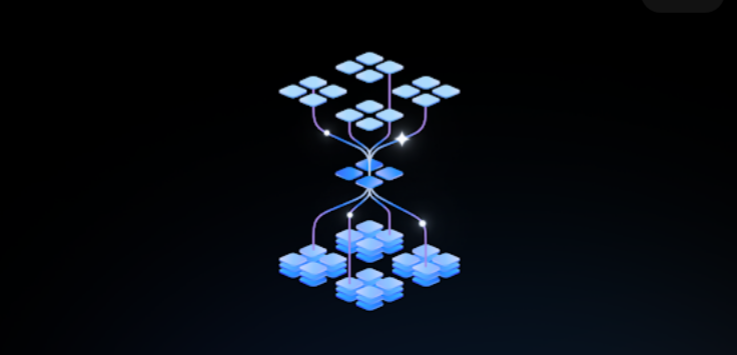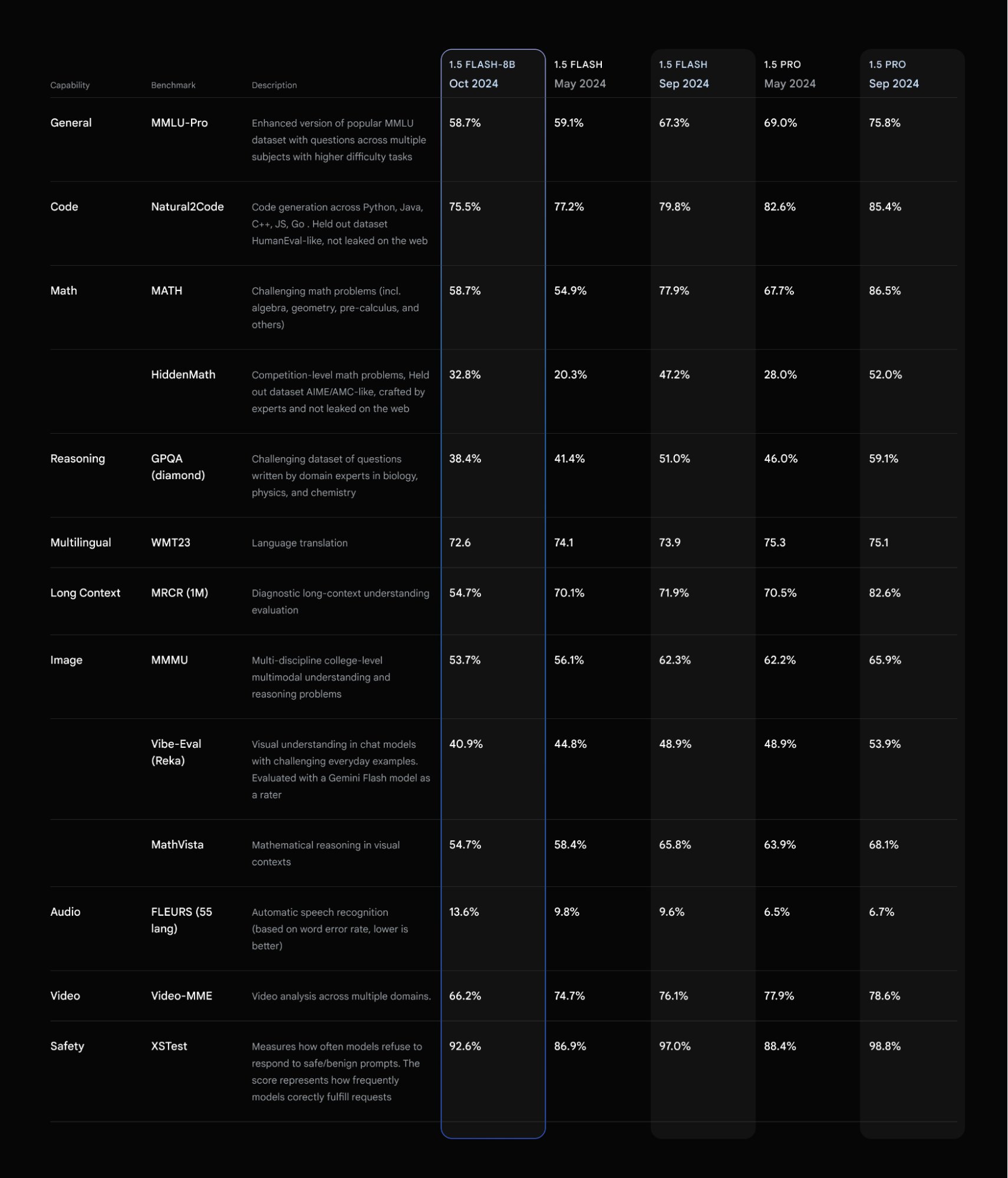Unveiling Google Gemini 1.5 Flash 8B
the recent release of Google's Gemini 1.5 Flash-8B model and its impact upon the AI industry and business landscape. Gemini 1.5 Flash-8B represents a significant advancement in the field of lightweight AI models, offering impressive capabilities at a remarkably low cost. This development has far-reaching implications for businesses across various sectors and could potentially reshape the AI market.
The key features of Gemini 1.5 Flash-8B include a 50% lower price compared to the original 1.5 Flash model, doubled rate limits allowing for up to 4,000 requests per minute, and lower latency on small prompts, enhancing real-time applications. These improvements address several critical factors that have previously limited the widespread adoption of AI technologies: cost, scalability, and performance.

Pricing and Performance
The reduced pricing structure of Gemini 1.5 Flash-8B is particularly noteworthy. At $0.0375 per 1 million input tokens and $0.15 per 1 million output tokens for prompts under 128K tokens, it offers one of the most competitive pricing models in the market. This significant cost reduction could democratize access to advanced AI capabilities, allowing smaller businesses and startups to leverage AI technologies that were previously cost-prohibitive.The benefits of this pricing strategy are profound. It could lead to a surge in AI-powered innovations across various industries, as entrepreneurs and small businesses now have access to powerful AI tools at a fraction of the previous cost. This democratization of AI technology could potentially level the playing field between large corporations and smaller entities, fostering a more competitive and innovative business environment.
The increased rate limits, now at 4,000 requests per minute, address scalability concerns that have long plagued AI implementations. This enhancement enables businesses to handle higher volumes of AI-powered operations, making it suitable for applications requiring real-time processing of large amounts of data. Industries such as e-commerce, financial services, and customer support could particularly benefit from this increased capacity.
For instance, e-commerce platforms could now implement more sophisticated real-time recommendation systems, processing vast amounts of user data to provide highly personalized shopping experiences. Financial institutions could enhance their fraud detection systems, analyzing transactions in real-time with greater accuracy and speed. Customer support centers could deploy more advanced chatbots capable of handling a higher volume of inquiries simultaneously, improving response times and customer satisfaction.
Lower latency on small prompts is crucial for applications requiring quick response times, such as chatbots, voice assistants, and real-time decision-making systems. This improvement could lead to more seamless and natural interactions between AI systems and users, enhancing user experience across various platforms. The effects of this reduced latency extend beyond just improved user experience.
In fields like autonomous vehicles or industrial automation, where split-second decisions can be critical, this lower latency could significantly enhance safety and efficiency. Moreover, in the realm of augmented reality (AR) and virtual reality (VR), reduced latency could enable more immersive and responsive experiences, potentially opening up new avenues for entertainment, education, and professional training.
Comparing Gemini Models
The comparison graph highlights several key points regarding the performance of Gemini 1.5 Flash-8B, released in October 2024, in relation to its predecessors and the Pro version. Notably, Gemini 1.5 Flash-8B demonstrates significant improvements across various benchmarks compared to the earlier Gemini 1.5 Flash model from May 2024, particularly in areas such as math, reasoning, and long context understanding. While it generally performs lower than the Gemini 1.5 Pro version released in September 2024, it approaches parity in certain metrics like language translation (WMT23) and video analysis (Video-MME), showcasing its competitive edge. In terms of specific strengths, Flash-8B excels in code generation through the Natural2Code benchmark, as well as in language translation and video analysis, indicating its robust capabilities across these domains. However, there are notable areas for improvement; the largest performance gaps between Flash-8B and the Pro version are observed in advanced math problems (HiddenMath), complex reasoning tasks (GPQA), and certain aspects of image understanding (Vibe-Eval).
In terms of specific strengths, Flash-8B excels in code generation through the Natural2Code benchmark, as well as in language translation and video analysis, indicating its robust capabilities across these domains. However, there are notable areas for improvement; the largest performance gaps between Flash-8B and the Pro version are observed in advanced math problems (HiddenMath), complex reasoning tasks (GPQA), and certain aspects of image understanding (Vibe-Eval).
Additionally, Flash-8B shows a marked improvement in safety metrics as measured by XSTest, indicating a better ability to respond appropriately to safe prompts compared to earlier iterations. This enhancement underscores the model's focus on responsible AI use. Overall, Gemini 1.5 Flash-8B showcases its competence across a range of tasks spanning text, code, math, images, audio, and video, reflecting its multimodal capabilities. In summary, while it offers improved performance over previous versions of Flash, it still trails behind the more comprehensive Pro model in many areas, balancing efficiency with advanced functionality.
Market and Competitive Landscape
The release of Gemini 1.5 Flash-8B also has broader implications for the AI market. Firstly, it intensifies market competition. Google's aggressive pricing and performance improvements could pressure competitors like OpenAI and Anthropic to adjust their strategies, potentially leading to further innovations and price reductions across the industry.This competitive pressure could accelerate the pace of AI development, benefiting end-users and businesses alike. It could also lead to more specialized AI models tailored for specific industries or use cases, as companies seek to differentiate themselves in an increasingly crowded market.
Secondly, the democratization of AI enabled by Gemini 1.5 Flash-8B could accelerate AI adoption among small and medium-sized enterprises, fostering innovation and leveling the playing field. This could lead to a proliferation of AI-powered startups, each leveraging the technology to solve unique problems or address niche markets. The resulting innovation could drive economic growth and potentially create new job categories centered around AI implementation and management. However, it also raises questions about the potential displacement of certain job roles, necessitating a focus on reskilling and upskilling programs to ensure workforce adaptability.
Thirdly, the combination of low cost, high performance, and scalability could enable new AI applications that were previously unfeasible, particularly in resource-constrained environments or edge computing scenarios. This could be particularly impactful in developing regions, where access to powerful computing resources may be limited. For instance, it could enable the deployment of sophisticated AI models on mobile devices for offline language translation, medical diagnosis, or agricultural optimization. In edge computing scenarios, it could enhance the capabilities of Internet of Things (IoT) devices, enabling more intelligent and autonomous operation of smart home systems, industrial sensors, or environmental monitoring equipment.

Sustainability and Environment
The environmental impact of Gemini 1.5 Flash-8B is also worth considering. The efficiency gains in this model could contribute to reducing the overall energy consumption and carbon footprint associated with AI operations, aligning with growing concerns about AI's environmental impact.As businesses and consumers become increasingly conscious of their carbon footprint, the ability to deploy powerful AI models with lower energy requirements could become a significant competitive advantage. It could also align with corporate sustainability goals and regulatory requirements around energy efficiency and carbon emissions.
Data Compliance & Regulations
However, the release of Gemini 1.5 Flash-8B also raises some challenges and considerations that businesses and policymakers must address. Data privacy and security become increasingly important as AI becomes more accessible. With more businesses leveraging AI technologies, ensuring proper data handling and security measures becomes crucial, especially for those dealing with sensitive information.This could necessitate the development of new data protection frameworks and technologies specifically designed for AI applications. It may also require businesses to invest more in cybersecurity measures and data governance practices to mitigate the risks associated with AI-powered data processing and decision-making.
Ethical considerations surrounding AI use also come to the forefront with the widespread adoption of more powerful and accessible AI tools. Issues such as algorithmic bias, transparency in AI decision-making, and the potential for AI to be used in manipulative or harmful ways need to be carefully addressed.
This could lead to increased scrutiny from regulators and the public, potentially resulting in new AI governance frameworks and ethical guidelines. Businesses will need to be proactive in addressing these ethical concerns, potentially by implementing internal AI ethics boards or adopting third-party AI auditing services to ensure responsible AI use.
Additional Considerations
The impact on the workforce is another critical consideration. While AI tools like Gemini 1.5 Flash-8B can enhance productivity and enable new capabilities, businesses must also consider the potential impact on their existing workforce. This could necessitate significant investments in reskilling and upskilling programs to ensure that employees can work effectively alongside AI systems and take on new roles that emerge from AI adoption. It may also require businesses to reimagine their organizational structures and job roles to fully leverage the capabilities of AI while maintaining a balance with human skills and judgment.The educational implications of this AI advancement are also significant. As AI becomes more prevalent in the business world, there will likely be an increased demand for AI literacy across various professions. Business schools may need to adapt their curricula to ensure that future business leaders are well-versed in AI technologies, their applications, and their implications. This could involve introducing new courses on AI strategy, ethics, and implementation, as well as integrating AI concepts into existing business disciplines such as marketing, finance, and operations management.
From a strategic perspective, the release of Gemini 1.5 Flash-8B and similar advancements in AI technology necessitate a reevaluation of business models and competitive strategies. Companies will need to assess how AI can be leveraged to create new value propositions, enhance existing products and services, or optimize internal operations. This could lead to the emergence of new AI-first businesses that build their entire value proposition around AI capabilities. Established companies may need to undergo digital transformations to fully integrate AI into their operations and stay competitive in an increasingly AI-driven market.
The global implications of this AI advancement are also worth considering. As AI becomes more accessible and powerful, it could accelerate technological leapfrogging in developing countries. Regions that may have lagged in traditional infrastructure development could potentially leverage AI to address critical challenges in healthcare, education, agriculture, and governance. This could lead to new patterns of global competition and collaboration, as countries and businesses seek to harness AI for economic development and social progress.

The legal and regulatory landscape surrounding AI is likely to evolve in response to these technological advancements. As AI systems become more prevalent and influential in decision-making processes, questions of liability, accountability, and regulatory oversight will become increasingly complex. This could lead to the development of new legal frameworks specifically designed to address AI-related issues, potentially impacting how businesses develop, deploy, and manage AI systems.
In the realm of research and development, the availability of more powerful and accessible AI models like Gemini 1.5 Flash-8B could accelerate scientific discovery and innovation. Researchers in fields ranging from drug discovery to materials science could leverage these AI capabilities to analyze vast datasets, generate hypotheses, and simulate complex scenarios. This could lead to breakthroughs in various scientific disciplines, potentially addressing global challenges such as climate change, disease prevention, and sustainable energy production.
The implications for entrepreneurship and innovation are particularly exciting. The reduced barriers to entry in terms of cost and technical complexity could lead to a new wave of AI-powered startups. Entrepreneurs with domain expertise in various industries could now more easily leverage AI to create innovative solutions, potentially disrupting established markets or creating entirely new ones. This could lead to a more dynamic and diverse business ecosystem, with AI serving as a catalyst for innovation across various sectors.
From a consumer perspective, the advancements represented by Gemini 1.5 Flash-8B could lead to more personalized and intelligent products and services. As businesses leverage these AI capabilities, consumers may benefit from more tailored recommendations, more efficient customer service, and products that adapt to their individual needs and preferences. However, this also raises questions about data privacy and the ethical use of personal information, which businesses will need to navigate carefully to maintain consumer trust.
The geopolitical implications of AI advancements are also worth considering. As AI becomes increasingly central to economic competitiveness and national security, countries may vie for leadership in AI development and deployment. This could lead to new forms of technological competition or collaboration between nations, potentially reshaping global power dynamics. Businesses operating in this environment will need to be aware of these geopolitical considerations, particularly when it comes to data governance, intellectual property protection, and compliance with varying national AI strategies and regulations.
Hitting Milestones
The release of Gemini 1.5 Flash-8B represents a significant milestone in the democratization of AI technologies. Its combination of lower cost, improved performance, and increased scalability has the potential to accelerate AI adoption across various industries and enable new innovative applications. It's crucial to understand the implications of such technological advancements and be prepared to leverage them effectively while addressing the associated challenges and ethical considerations.The businesses that can successfully integrate these AI capabilities into their operations and strategy will likely gain a significant competitive advantage in the rapidly evolving digital landscape. However, this integration must be done thoughtfully, with careful consideration of ethical implications, data privacy concerns, and the impact on the workforce. It will require a holistic approach that combines technological expertise with strong business acumen and a deep understanding of societal implications.
The rapid pace of AI advancement underscores the need for continuous learning and adaptation in the business world. As future business leaders, we must cultivate a mindset of lifelong learning and technological curiosity. We must be prepared to continuously update our skills and knowledge to keep pace with AI advancements and their implications for business and society.
The release of Gemini 1.5 Flash-8B is not just a technological milestone; it's a catalyst for reimagining business models, operational processes, and the very nature of work itself. It presents both exciting opportunities and significant challenges that will shape the business landscape for years to come. As we navigate this AI-driven future, our success will depend on our ability to harness these powerful technologies responsibly and creatively, always keeping in mind the broader impacts on society and the planet.
In this new era of accessible and powerful AI, the most successful businesses will be those that can strike the right balance between technological innovation and human-centric values. They will be the ones that use AI not just to optimize existing processes, but to reimagine what's possible, creating new value propositions and solving complex global challenges. As we stand on the brink of this AI revolution, it's an exciting time to be entering the business world, full of opportunities to make a meaningful impact through the thoughtful application of these transformative technologies.
Machine Learning Artificial Intelligence News
https://machinelearningartificialintelligence.com
AI & ML



Sign Up for Our Newsletter